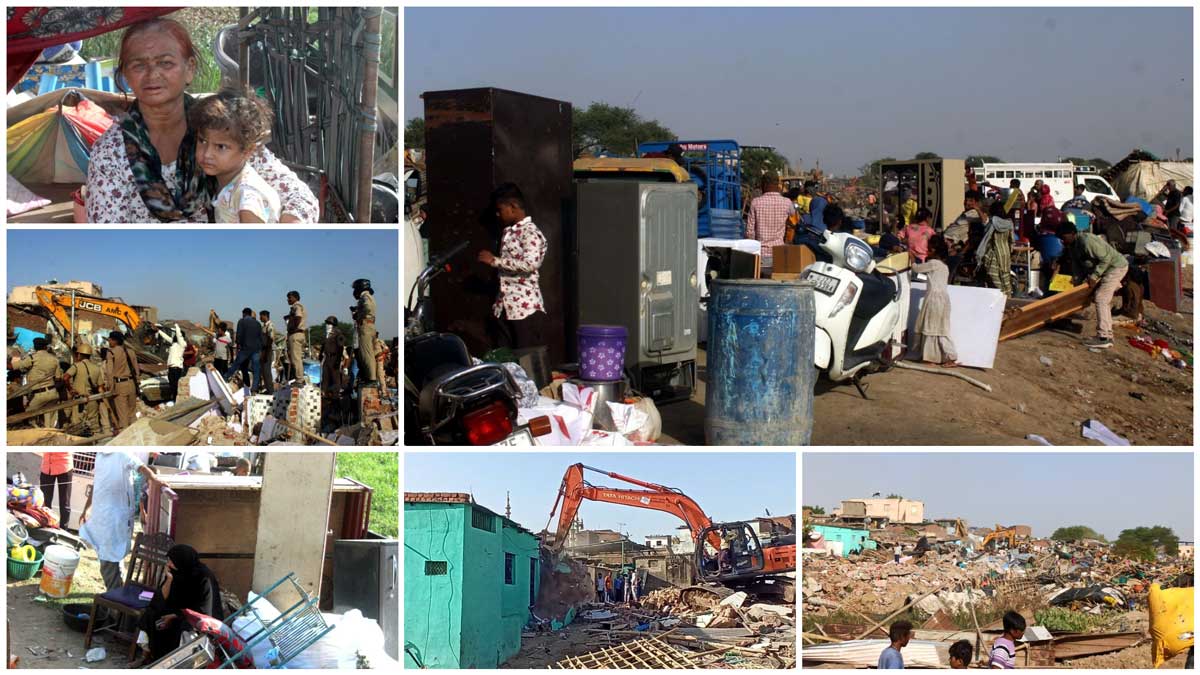On April 29, civil authorities, backed by a heavy police presence, launched a large-scale demolition drive targeting Muslim-majority neighbourhoods near Chandola Lake. The operation was initiated amid heightened security concerns following the April 22 terrorist attack in Pahalgam, Jammu and Kashmir. Authorities focused the crackdown on nearly 1 lakh square metres of government land, alleging illegal encroachment by suspected Bangladeshi nationals. Officials cited suspicions of undocumented Bangladeshi migrants residing in the area as a central justification for the action.
In the days leading up to the demolition, approximately 900 individuals—predominantly Muslims—were reportedly detained under similar suspicions of illegal residency. As footage of the operation began circulating on social media, images showed bulldozers advancing into the locality, razing makeshift structures and shanties identified as unauthorized dwellings.
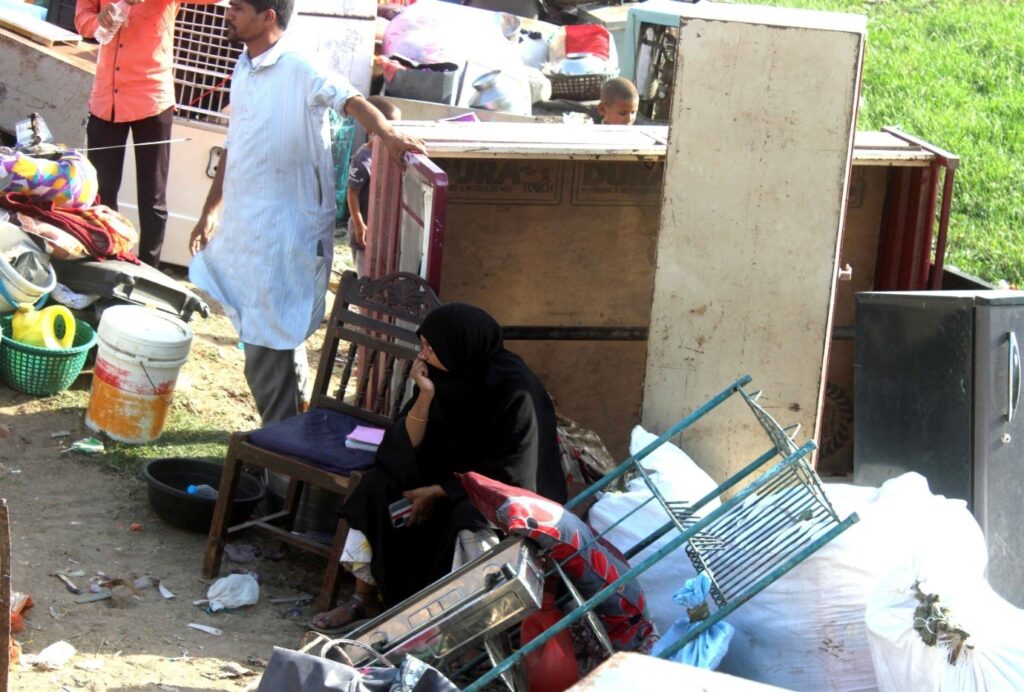
This drive marks the city’s most extensive anti-encroachment effort since 2009, drawing both sharp criticism from civil rights groups and vocal support from local officials who framed the action as a step toward restoring law and order on public land. However, concerns have been raised over the timing, targeting, and potential communal implications of the operation, particularly given the absence of clear legal proceedings in many of the reported detentions.
AMC demolishes illegal settlements near Chandola Lake #Ahmedabad
Joint CP (Crime) Sharad Singhal says majority of residents were Bangladeshis
Action comes amid ongoing drive against illegal encroachments#chandolalake pic.twitter.com/VvZaq86gXh
— Nabila Jamal (@nabilajamal_) April 29, 2025
A persistent challenge around Chandola Lake
An Indian Express report provides context to the demolition drive, highlighting a long-standing pattern of encroachment in the Chandola Lake area. The last major clearance operation dates back to 2009, indicating that unauthorised construction and settlement have been an ongoing issue for over a decade. According to recent surveys conducted by the Ahmedabad Municipal Corporation (AMC), there has been a noticeable resurgence of informal settlements, especially around areas like Siyasatnagar and Bengali Vaas. Authorities allege these shanties were primarily inhabited by undocumented Bangladeshi immigrants—an assertion that now forms a cornerstone of the rationale for the demolition.
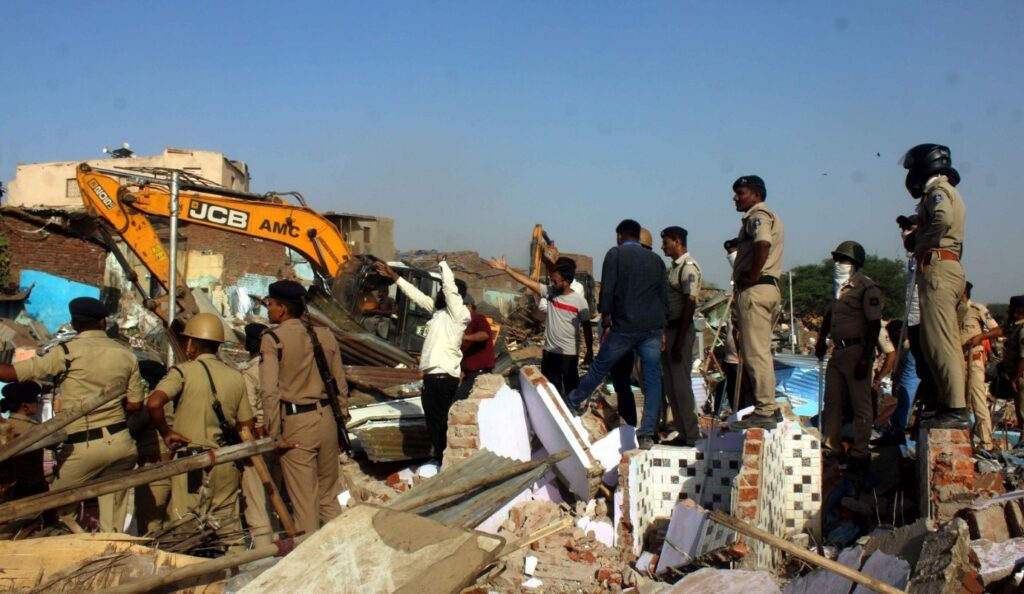
Indian Express reported that, “the last demolition drive at Chandola Lake was carried out in 2009. Recently, a survey conducted by the AMC revealed that government land had been encroached upon again, and shanties were constructed around the lake. Illegal Bangladeshi immigrants lived in areas like Siyasatnagar and Bengali Vaas surrounding this lake.”
However, the sudden escalation and timing of the drive—just days after the April 22 terrorist attack in Jammu & Kashmir’s Pahalgam—raise pointed questions. Is this a targeted security measure, or has the tragic event been used as a pretext to justify mass displacement without adequate legal safeguards?
Ministerial justification: called ongoing demolition as national security response
Gujarat’s State Home Minister and BJP MLA from Surat, Harsh Sanghavi, publicly endorsed the AMC’s operation. He presented it not merely as an alleged anti-encroachment effort but as a critical national security initiative. In a widely circulated statement on social media platform X, Sanghavi cited connections to terrorism, drug cartels, prostitution rackets, and forged document syndicates—all allegedly operating within the demolished settlements.
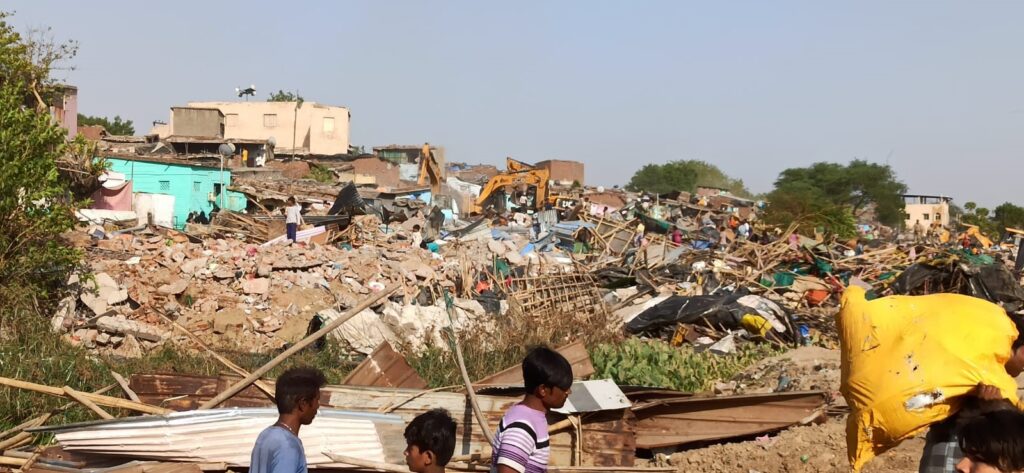
“Chandola Lake Ahmedabad!! The Government of Gujarat has taken historic steps to prevent anti-national activities by Bangladeshi nationals. Key Aspects of Demolition Drive: – Al-Qaeda Sleeper Cells: The location where 4 terrorists were detained by Gujarat ATS has been demolished. – Drug Cartels: Encroachments linked to numerous exposed drug cartels have been demolished. – Illegal Bangladeshi Residents: Encroachments of illegal Bangladeshi residents have been detained and demolished. – Prostitution Network: A major prostitution network operating from the area has been busted. – Forged Documents Nexus: A network creating false documents has been cracked down upon. Action Taken: – Over 2,000 policemen, 15 SRP companies, and municipal staff participated in the operation. – 74 JCBs, 200 trucks, and 20 electrician teams were deployed. – Approximately 2,000 hutments/encroachments, 3 illegal resorts, and parking units were razed. – The Chandola Lake area has been reclaimed” Singhvi wrote on X
Chandola Lake Ahmedabad!!
The Government of Gujarat has taken historic steps to prevent anti-national activities by Bangladeshi nationals.
Key Aspects of Demolition Drive:
– Al-Qaeda Sleeper Cells:The location where 4 terrorists were detained by Gujarat ATS has been… pic.twitter.com/GWGM1exWab
— Harsh Sanghavi (@sanghaviharsh) April 29, 2025
Arrest and investigation of Lala Mehmood Pathan
As per reports, the demolition campaign began with a focus on a farmhouse allegedly owned by Lala Mehmood Pathan, also known as Lallu Bihari. Authorities accuse him of facilitating illegal settlements by forging rental agreements and producing fraudulent identity documents, including Aadhaar cards. An FIR has been filed against Pathan, and police claim to have uncovered over 590 forged passports allegedly linked to undocumented migrants, as Times of India reported
While these allegations are serious and merit investigation, the broad demolition campaign that followed appears to conflate individual criminal activity with the legitimacy of an entire community’s residency. Moreover, the official narrative linking these findings to national security threats has yet to be backed by court convictions or an independent probe.
Gujarat High Court denies interim relief, cites illegality of construction
On April 29, as the demolition drive intensified, the Gujarat High Court refused to grant interim relief to the residents challenging their eviction.
Justice Mauna Bhatt refused to stay the demolition drive after observing the dwellings of the petitioners were on the periphery of the water body and as per section 37 of the Land Revenue Code, such structures can be razed by the government, petitioners’ lawyer Anand Yagnik said, reported the Indian express.
The court observed that since the petitioners are “illegal encroachers,” relief from demolition cannot be granted to them. The court further added that the petitioners had constructed their homes on notified lake land without obtaining the required permissions. As a result, the case fell outside the scope of the recent Supreme Court judgment in Rajendra Kumar Barjatya and Another vs. UP Avas Evam Vikas Parishad & Ors. (SLP/36440/2024) dated December 17, 2024, which mandates prior notice before eviction in cases where occupants have established long-standing residence. Citing this precedent, the High Court reiterated that prolonged unauthorised occupation does not create legal entitlements for encroachers.
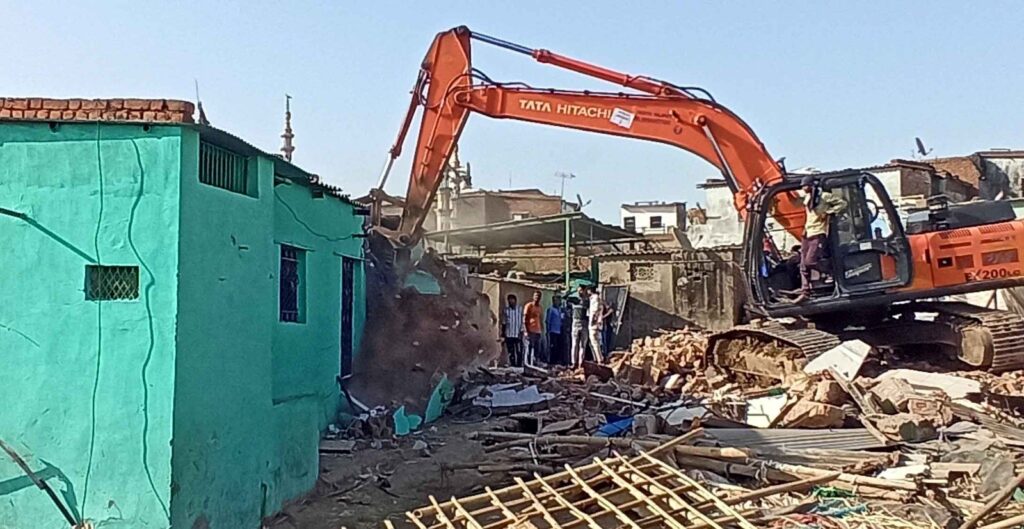
Accordingly, the court ruled that no interim protection against eviction or demolition could be provided. However, at the request of the petitioners’ advocate, the case has been kept pending to allow for the filing of a rejoinder. The matter is now scheduled to be heard after the court’s vacation, leaving room for further legal arguments.
State’s argument: national security as override to due process
During the hearing, the Gujarat government argued that the demolition drive was not a routine civic action but a necessary response to “specific inputs” following the Pahalgam attack. The state claimed that the presence of suspected illegal immigrants in a sensitive area warranted urgent intervention, even if it meant suspending the usual procedural norms associated with eviction and demolition.
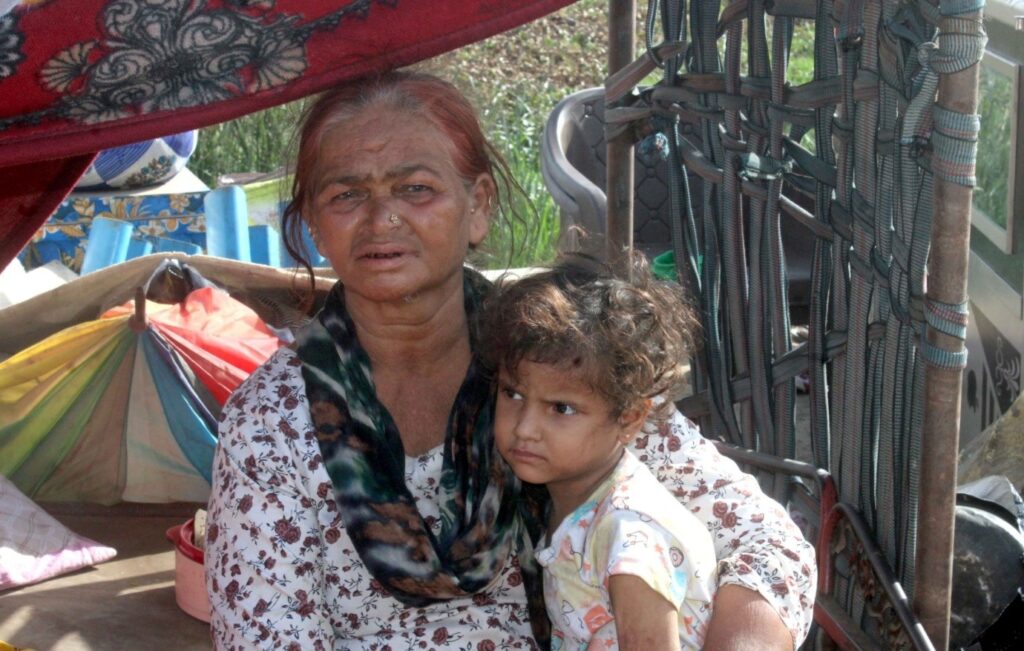
The High Court appeared to accept this argument, allowing the operation to proceed. However, this legal positioning—where “national security” overrides principles of natural justice—has sparked significant debate. Legal scholars and rights advocates warn that such reasoning risks setting a dangerous precedent, where vague or unverified threats can be used to sidestep constitutional protections.
Petitioner advocate’s critique: questioning identification and due process
Following the court’s order, petitioners’ advocate Anand Yagnik addressed the media, raising serious concerns about procedural violations and wrongful detentions. Advocate Anand Yagnik, in his statement to the media regarding the demolition drive near Chandola Lake, conveyed the High Court’s stance. He stated, “The High Court of Gujarat, while dealing with petition of 18 citizens, majority of them are women, have refused to grant interim relief against demolition on the ground that these petitioners are apparently on the water body. Therefore, the judgment against demolition passed by the Supreme Court will not apply to them. They do not have any permission to put up construction on government land, which is otherwise a water body. Therefore, the court is not inclined to grant any interim protection against the demolition and permission to the petitioner to stay near the lake” as ANI reported
#WATCH | Ahmedabad, Gujarat | On the demolition drive near Chandola lake, Advocate Anand Yagnik says, “The High Court of Gujarat, while dealing with petition of 18 citizens, majority of them are women, have refused to grant interim relief against demolition on the ground that… pic.twitter.com/gsNrjbPKLA
— ANI (@ANI) April 29, 2025
He also acknowledged the court’s interpretation of construction on lake land but emphasised that even if undocumented migrants were present, repatriation must be handled through the legally mandated process—via the Foreigners’ Tribunal.
Yagnik said that, “There may be Bangladeshi nationals among the residents of the (Chandola Lake) area, one does not deny that. But, these immigrants should be sent back as per the process of law, with orders of the Foreigners’ Tribunal with dignity and respect… But by the way, in the last four days, the state government of Gujarat has picked up 1,200-1,500 people by tagging them as Bangladeshis, and also released 90% of them as they were found to be Indian nationals and not Bangladeshis… Now, in a demolition drive the authorities are also bulldozing the homes of those, who have not been found to be Bangladeshi nationals” as the Indian Express reported.
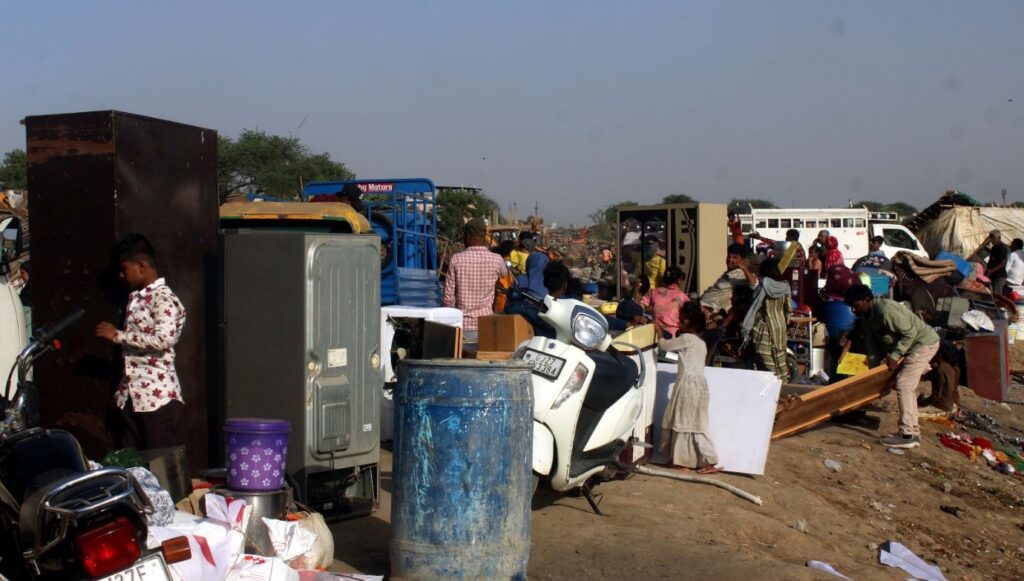
Yagnik revealed a deeply troubling detail that of the estimated 1,200 to 1,500 people detained by the Gujarat police in the days leading up to the demolition, nearly 90% were subsequently released after being identified as Indian citizens. If accurate, this implies a staggering failure in the initial identification process—suggesting that hundreds of individuals may have been arbitrarily arrested, detained, and had their homes demolished under erroneous assumptions of foreign origin.
“Sensitive Input” trumps natural justice in urgent hearing
In its affidavit to the High Court, the Gujarat government maintained that the principles of natural justice should not obstruct actions taken to protect national security in the Chandola Lake area. During an urgent hearing convened on Tuesday afternoon for the petition filed by approximately 23 residents of Siasat Nagar, the High Court ultimately sided with the state. The court accepted the argument that the demolition was not a “regular drive against encroachment” but a targeted operation driven by “specific input” concerning illegal immigrants, thus denying the residents any interim relief.
Related:

